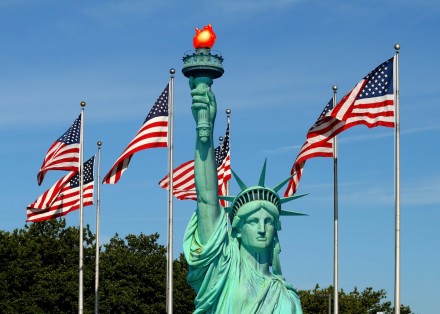Happy 4th of July!
The premiere episode of Aaron Sorkin’s new drama series The Newsroom (HBO) opens with a real bang. It does so by sacrificing a sacred cow held by many Americans: the belief that the United States is ‘the greatest country in the world’.
This idea is so commonplace as to be ubiquitous. It isn’t enough for most Americans, as they watch the fireworks on the 4th, to know that their country is great; it must be thought of as the greatest, and at he who admits anything less, the charge of being unpatriotic is thrown more often than not. Someone who does not believe that America is the greatest country in the world may as well be burning the flag. They’re at grave danger of being thrown on a bonfire. Such people – like Sorkin himself this week – are routinely told to simply leave the country if they don’t like it, as if all of America’s problems are the result not of failure to deal with them but of those pesky people pointing them out.
As an immigrant here, I am one of the minority of Americans who chose this country, rather than being here by default. So, it should come as no surprise to anybody that I possess a very high opinion of the United States and its people; so much so that I wanted to be one of them! I genuinely feel patriotic about America, after only a few short years spent here.
Not only that, but I’ve always felt that the ideals of the United States stand alone as the greatest, most moral political ideals ever put into practice. A couple of hundred years ago, the Founding Fathers began an ambitious experiment in liberty and equality and justice. I still think these early blueprints for a great country stand America in wonderful stead today, and the closer the nation’s people stick to them, the better off they tend to be. Unfortunately they haven’t done so in all cases.
The Newsroom’s lead character, news anchor Will McAvoy (played by Jeff Daniels), answers a question about America’s greatness by dropping this bomb:
“There is absolutely no evidence to support the statement that we’re the greatest country in the world. We’re 7th in literacy, 27th in math, 22nd in science, 49th in life expectancy, 178th in infant mortality, 3rd in median household income, number four in labor force, and number four in exports. We lead the world in only three categories: number of incarcerated citizens per capita, number of adults who believe angels are real, and defense spending where we spend more than the next 26 countries combined, 25 of whom are allies. So when you ask what makes us the greatest country in the world, I don’t know what the **** you’re talking about.”
Ouch.
Actually, I’ve made this very same point to challenge the chest-pounding arrogance I’ve detected in some of my opponents in political debates over the years. It is a quo modus argument, if you will: it dares to ask, ‘By what measure do you claim that America is the greatest country in the world?’ The claim of being greatest entails comparison. If something is the greatest thing in its category, then it is the greatest in comparison to the rest. If America is the greatest country in the world, then by definition it is greater than all of the other countries on earth. But by what measure can it be claimed that America is greater than all other countries on the planet?
Unfortunately, the claim is difficult to substantiate, empirically. By the measure of its citizens’ level of education, America is not greater than 20 other countries (1). By the quality of overall health of its citizens, it is not greater than 36 other countries (2). By the prosperity of its citizens, it is not greater than 6 other countries (3). By the United Nations Human Development Index, it is not greater than 3 other countries (4). By other indices of happiness, it never makes the top spot, which is a shame given the high value assigned to the pursuit thereof by its founders (5). Even on measures such as personal freedom and privacy, America since 2001 has been losing ground (again, arguably as the result of ignoring the advice of its founders by sacrificing liberty to achieve security, of which the advice of Ben Franklin is a famous example).
All of this paints a rather bleak picture, no?And yet, I don’t feel that way about America. I moved here after 9/11. Why, you might ask, if liberty and privacy here aren’t what they once were? And why, if the United Kingdom – my country of birth – ranked higher in some of the above measures (though lower in others)?
As I think about my adopted homeland this 4th of July week, the United States still possesses the promise, the spirit and the essence of greatness. I feel more alive here than anywhere else. America’s opportunities – although stunted by the results of some stupid policies – are still vast. It is dynamic, dramatic, exciting. People are still building and innovating. Fortunes are still being made and lost. People of all colors, cultures, backgrounds and values are still being hastily mixed together in this great melting pot, with a blindingly awesome spectrum of results. Life, warts and all, happens here with gusto.
Sorkin’s opening shot in The Newsroom is a tough pill for Americans to swallow: that America is not, on paper, the greatest nation on earth. But I’ve often thought that one important aspect of greatness is humility about the fact. Maybe it’s naive to think so, but perhaps a key to restoring America’s position in the world may lie in accepting that it still has work to do.
By embracing the United States of America as it is, instead of what we’re pretending it is, Americans can honor the values of this nation’s founders by staying on task: to humbly keep building the greatest country in the world from its blueprints, which give it the best possible advantage.
JW
###
John Wright is host of KLPZ’s weekday afternoon show from 3-5pm and editor of Parker Live. He grew up in Northern Ireland and moved with his American wife and son to the Parker area in 2004.
(1) U.N. Education Index, 2007
(2) World Health Organization, 2000
(3) International Monetary Fund, 2010-2011
(4) U.N. Human Development Index, 2011
(5) e.g. Satisfaction with Life Index, 2006
 Parker Live News from the Parker Strip since 2009.
Parker Live News from the Parker Strip since 2009.






